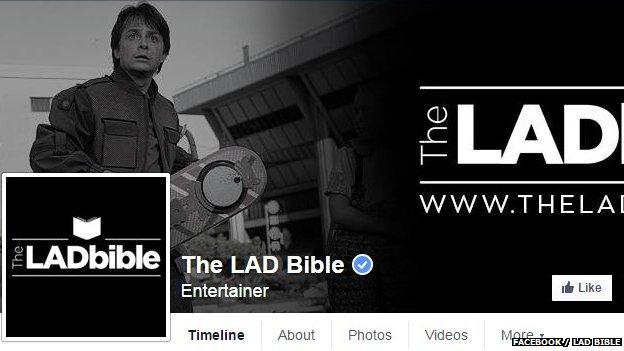How did The Lad Bible become so successful?
- Published

If you use Facebook, the chances are that you have seen the material - videos of Rambo-themed stag parties, mobile discos paraded through supermarket aisles, or a man changing a nappy wearing a gas mask.
They are hosted on a website called the Lad Bible and are being shared in their thousands by its 17 million followers, across Facebook, Twitter and Reddit.
The LAD Bible is a mixture of video and photos, some of it posted by users, the rest harvested from the four corners of the internet.
It has a sister site, the Sport Bible, but should not be confused with Unilad, which has a similar feel but was founded by a separate team.
Web analytics site Alexa reports, external Lad Bible is the 12th most popular website in the UK, above more established resources such as LinkedIn, PayPal and the Guardian.
But its popularity is not universal.
'Redefines lads'
Features such as Cleavage Thursday or Bumday Monday, now phased out, have attracted accusations of sexism, particularly from student groups.
Mimi Turner told BBC Radio 5 Live that The LAD Bible is bigger than just 'lad culture'
Laura Bates, of Everyday Sexism, has written, external the Lad Bible and sites like it represent "a culture of misogyny sickeningly disguised as 'banter'".
Radhika Sanghani, of the Telegraph's Women pages, has said they "encourage male users to rate women and make misogynistic comments".
These charges are rejected by the Lad Bible's marketing director, Mimi Turner, in an interview with BBC Radio 5 live.
She told BBC Radio 5 live: "A quarter of 'lads' reading the site are actually women," and that it "absolutely redefines what lads are".

Ed Sheeran, rendered on a man's chin. Yes, it's Ed Sheerchin
Her own recruitment was reported by the Telegraph, external and the Guardian, external as a sign the website was making an effort to rebrand itself.
Contrasting the site with older household names, she said: "We're two years in, and a lot of my job is about how we scale up what we're doing and stay relevant. What are we doing that's different?"
Asked about the disappearance of some of the less safe-for-work features, she said: "Do you know why? They're just not funny and clever enough to meet the content standards for what we need."

Marketing director Mimi Turner: "A lot of my job is about how we scale up what we're doing and stay relevant."
Summarising the Lad Bible's appeal, she said: "We have a huge appetite for relatable content - somebody doing something foolish or crazy or brave or inspiring that you might do too.
"That's a type of content that lends itself to social media, whereas it was never a lever that Loaded or Zoo could pull."
This ability to attract clicks has made the Lad Bible highly sought after by advertisers.
BuzzFeed reported, external it made more than £1m a year from advertising.
The range of groups advertising on the site - from PlayStation to Oxfam - is testament to its pulling power.
'Cats and cleavage'
BBC Click's social media reporter LJ Rich said: "What the Lad Bible does well is it collates things. It's like a Pinterest."
"It has changed a lot over the past couple of years, which does seem to be a model for a lot of companies - you start off by getting some kind of stranglehold on the market, then you can make yourself acceptable to a wider demographic."

Warning: Cats are not a shortcut to clicks, Ms Turner advises
But Ms Turner said: "You can get a small number being nasty and shocking and controversial, but you can't get to 17 million.
"At 17 million you're building a community who know why they're going back.
"You can't do it quickly with cats, you can't do it quickly with cleavage."
She told BBC Radio 5 live the site was growing by 250,000 followers a week and getting 3.5 million "likes", shares and comments on its media every day.
While Ms Turner is happy to spread the word, co-founders Alex Solomou and Arian Kalantari prefer to keep a low profile.
But if their creation continues to grow at such a rapid pace, they may not be able to stay out of the spotlight much longer.